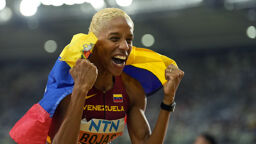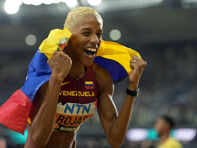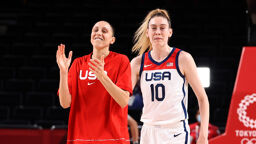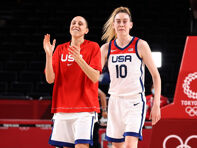It’s still dark in his small Upper East Side apartment when the alarm clock introduces Wade Davis to this Thursday morning in late May. His partner, Steven, sleeps while Davis slips into his regalia: A checkered shirt, slick pants and a bright tie. He kisses Steven and says good-bye. He’ll be back in a few days.
He leaves the apartment as the sun rises, headed for Penn Station. It’s a welcome couple days out of the office for Davis, a staff member at the Hetrick-Martin Institute, which serves lesbian, gay, bisexual, transgender or questioning youth. Ten years ago, Davis had never heard the term “LGBTQ.” While a closeted cornerback struggling to make a roster in the National Football League, he was as far from the gay community as Ryan Leaf is from the Hall of Fame. Now, as assistant director of job readiness at HMI, Davis prepares these youth for the workplace. He wrangles corporations to run workshops and counsels his students on career opportunities. It’s the closest role to “coach” he could find at the Institute.
It’s still dark in his small Upper East Side apartment when the alarm clock introduces Wade Davis to this Thursday morning in late May. His partner, Steven, sleeps while Davis slips into his regalia: A checkered shirt, slick pants and a bright tie. He kisses Steven and says good-bye. He’ll be back in a few days.
He leaves the apartment as the sun rises, headed for Penn Station. It’s a welcome couple days out of the office for Davis, a staff member at the Hetrick-Martin Institute, which serves lesbian, gay, bisexual, transgender or questioning youth. Ten years ago, Davis had never heard the term “LGBTQ.” While a closeted cornerback struggling to make a roster in the National Football League, he was as far from the gay community as Ryan Leaf is from the Hall of Fame. Now, as assistant director of job readiness at HMI, Davis prepares these youth for the workplace. He wrangles corporations to run workshops and counsels his students on career opportunities. It’s the closest role to “coach” he could find at the Institute.
His destination today is the Philadelphia Trans-Health Conference, where some of his students are giving a presentation about being allies to the transgender community. Later that night he and a colleague host the youth for some board games in his hotel room. It’s a thunderous round of Taboo, complete with plenty of teenage jokes and needling. When the kids leave just shy of midnight, Davis calls me on the phone.
“Damnit I lost,” Davis says. Then, convincing himself, “It’s okay, my team was just joking around. But man, I hate to lose.”
Davis’ competitive nature once kept him at arm’s length from the gay community. Even years after coming out to close friends, he carried the “gay-is-weak” mantra in his head. Despite having been years from his pro-football career, the mental gap between himself and a community full of gender-non-conformists was not easy to close.
As we talk about his work with youth and his time playing in the NFL and NFL Europe, I ask him about his reason for leaving the competitive sports world for a non-profit job working with youth he would have taunted when he was their age. The gregarious voice on the other end of the line gets quiet for a moment.
“How many people get to live out their two dreams?” Davis asks. “I got to play in the NFL, and now I get to change the world.”
Titanic Tour of Duty
Davis learned a key NFL survival lesson in the summer of 2000 at his first training camp with the Tennessee Titans. He was a free agent rookie battling several other players for one newbie spot in the team’s secondary.
Davis has long had a fundamental understanding of defensive schemes. For fun, he would draw up formations in his free time, challenging himself to think outside the box. His roommate at that training camp struggled to grasp the playbook. When he asked about different formations, Davis would deflect the questions. On the field, Davis demonstrated his comprehension of the philosophy behind the schemes; His roommate blew coverage and was soon released.
“I felt awful because I wanted to be a good teammate,” Davis says of his refusal to help the other rookie, “but I wanted to make the team.”
The lesson was clear: Until he was on the team, he needed to look out for himself. He needed to play selfishly.
Davis quickly developed a likable persona on the team: Rookie comic. During a rookie talent show, he sang “She’s Your Queen” from the Eddie Murphy film Coming to America. He brought the house down. Veterans gravitated toward him. At night he’d often find himself in Jevon Kearse’s room playing spades with Samari Rolle. Years later, Rolle would invite Davis to his wedding.
The veterans even hazed him differently. While other rookies had various body parts shaved, Davis was forced to navigate a daily shampoo gauntlet as he left the showers, a ritual that sent him back to clean up over and over until the veterans relented.
Davis had won over the locker room, which is the very reason he never uttered a word about his sexual orientation.
“You just want to be one of the guys, and you don’t want to lose that sense of family,” Davis says. “Your biggest fear is that you’ll lose that camaraderie and family. I think about how close I was with Jevon and Samari. It’s not like they’d like me less, it’s that they have to protect their own brand.”
When I caught up with Kearse at the NFLPA’s Rookie Premiere event in May, he still remembered Davis fondly a decade later. “That’s my dog,” Kearse said. He had no idea that Davis was gay until that event last month.
“I know there have been a lot more than just Wade,” Kearse said upon learning of Davis’ sexual orientation. “It’s just becoming more acceptable, which is a good thing so they can come out and not feel secluded.”
Eddie George was on the other side of the ball with the Titans while Davis was there. The former Heisman Trophy winner didn’t know Davis was gay at the time, but he feels a gay athlete on that Titans team would have been accepted.
“I don’t see it as a problem,” George said. “I don’t think it would have been a problem at all.”
Despite the vocal support a decade after the fact, Davis remembers whispers about a player on the team whom others thought was bisexual. At least one teammate told Davis he should steer clear of the guy, lest it hurt his chances of making the team.
“They’d say, ‘You know what Wade? You have a chance to make this team. You probably shouldn’t associate with that guy,’” Davis remembers. “It wasn’t said as though [his bisexuality] was a bad thing, it was just that I should not let this perception be on my shoulders too.”
Davis kept his secret hidden to increase his chances of making the team. And his chances looked good, until a tweaked hamstring derailed him. He missed two preseason games until then-defensive-backs coach Jerry Gray came to him with a dose of reality: If he couldn’t play in their final preseason game, they just couldn’t keep him.
Davis’ lasting memory of that game against the Chicago Bears was covering wide receiver Eddie Kennison. Despite Davis playing press coverage, Kennison caught a screen pass that went for 30 yards. Davis was let go the next day, but he was sent to NFL Europe’s Berlin Thunder, allocated by the Titans (“allocation” meant a guaranteed roster spot and more playing time).
Davis calls that season with the Thunder “the most enjoyable time of my life.” While statistics are hard to come by for NFL Europe, Davis said he was second in the league in tackles that season; He recorded one interception and 0.5 sacks. His team won the World Bowl that season against the Barcelona Dragons, 24-17.
He was also dating another man for the first time. His boyfriend was thousands of miles away in the United States, but it was his first taste of what it meant to feel whole. Davis talked about his boyfriend with his Thunder teammates as though he was dating a woman. Despite the deception, he started to relate to his team because of the relationship.
“I started to think it was possible for me to have a partner and play football at the same time, even if it was done covertly,” Davis says. “I felt normal for the first time.”
When he returned to the NFL for the 2001 season, the Titans had shipped Davis off to the Seattle Seahawks. While he was loved in the Titans locker room, the Seahawks perceived him as a rebel who wouldn’t play by the rules. He remembers one practice when Darrell Jackson made a double move on him. Instead of biting on the first move, he read the second move and intercepted the ball. He was cut soon after that.
In 2002, he returned to NFL Europe for his second stint, this time with the Barcelona Dragons. It was in Barcelona that his sexuality began to push through Davis’ straight façade. The team spent time near Sitges, a town just south of Barcelona known as one of the gayest cities in the world. Virtually every afternoon, a man on a balcony across the street from Davis’ hotel room would sunbathe nude. Davis took notice.
“After practice I’d yell at the bus driver to go faster so I could make it back to my room to watch him,” Davis remembers.
Often the life of the party, Davis would get dragged by his teammates to a local brothel where he’d pay women to spend time sitting on a bed talking. It was worth the $100 to continue the charade in front of his teammates.
“It was probably the most mentally taxing time of my life,” Davis says. “Being there and being in the closet was tough.”
The next two preseasons in the NFL went much like the first two. In 2002, he suffered an injury in the Titans training camp and was cut. The following year, Steve Spurrier invited him to Washington Redskins training camp. There he dislocated his kneecap and tore his patella tendon. Davis’ dream of NFL stardom would never shine.
“There was a part of me that was a little relieved because, when I knew football was over, my life would begin,” Davis said. “I had this football life, but I didn’t have another life away from that. Most of the guys had a family and a wife, but I had football and nothing else.”
Football Becomes Gay
It was 2006 when I first met Davis. While his NFL career had been over for three years, his love of the sport still dominated his autumn Sunday afternoons. I was building a team to take to the gay flag football national championships, known as the Gay Bowl, and Davis was eager to finally marry his sexual orientation with his inner athlete. Along with our teammates, we won three straight Gay Bowls with the New York Warriors, the first team to do so. He was named the MVP of the tournament his first year.
More importantly for Davis than the success on the field was a spiritual awakening that came with finding the New York Gay Football League. While the league is rife with high-caliber athletes, there’s a preponderance of players with little or no football experience. The league also boasts a cross-section of the entire LGBT community, complete with feminine men, drag queens, and transgender men and women, in addition to the masculine jocks. With his depth of experience and knowledge, Davis found himself for the first time in the role of mentor. It’s a role that would change his life.
“The hardest thing I found when I first joined the gay football league was being my competitive self but not alienating the guys I wanted to become friends with,” Davis said. “It took me a while to embrace the role of mentor in the league because I was so focused on winning. After losing in [Gay Bowl X], I started taking my time to see life through other people’s eyes. I wanted the game of football to be tangible for everyone.”
One of those people was Jayce Jones. He had been in the New York Gay Football League for several years when he joined Davis’ team last summer. A good player with high self-worth, he learned from Davis a level of awareness and selflessness that has served him in his personal and professional life. Jones, a certified accountant, said Davis’ tutelage in flag football led him to an enhanced work ethic and a promotion at Barclay’s Capital last November.
“Wade helped me refocus on the minimal things in my life, as far as practice makes perfect,” Jones said. “I didn’t care about football anymore. When I played, I half-assed it all the time. He helped me realize if you half-ass things like this, you’re gonna half-ass it in the rest of your life as well. And if you keep living life at a minimal level, you’ll be looking back 25 years from now wondering, ‘what if?’”
Trans-Formation
His eye-opening work helping disenfranchised LGBTQ adults find their way through the uber-macho sport of football led Davis to his current work with youth. “If I didn’t play in the New York gay football league, I probably wouldn’t be doing this right now,” he said.
When he started his job at HMI in 2011, this former professional athlete who kept his sexual orientation hidden from his teammates was now set on keeping his athletic career a secret from his mostly LGBTQ co-workers. And for good reason.
“When I first saw him, I wondered why this straight man was working at this LGBTQ organization,” said Darnell Moore, director of education initiatives at HMI. “Then I thought he was a preacher. He didn’t seem to fit the mold of a black gay man. We have all these images of black men and masculinity, and he showed up differently. And when I found out he was an athlete, I had pre-judgments about him.”
As the longtime black LGBTQ writer and activist talked with Davis, he realized a very different man lived inside this uber-macho shell. “I quickly got the sense that I was talking to someone who had made a strong commitment by leaving behind the business world to leap into something his heart was driving him to do.”
Davis has since followed his heart and never looked back. He can’t see himself returning to the corporate world.
“Whatever I do, it will always involve kids,” Davis said. “The idea of just throwing money at these kids…I can’t do that. I want to have a real impact on these kids’ lives.”
Moore said Davis is a deeply respected member of the HMI staff. In under 18 months he has captured the hearts and minds of the students there. Moore, who has been working in the LGBTQ space for years in both Newark, N.J., and New York City, sees a born leader in Davis.
“He works very hard at making himself a better human being,” Moore said. “His high is watching the young people he works with grow and learn and have their lives changed positively. That’s what feeds him. He’s not fed by fame or the desire to be named great, he feeds off the lives of youth being positively impacted. All of the youth have something positive to say about him. Just what I know about his past, he’s always been driven. That’s how he got to the NFL. When he’s determined to succeed, he does.”
Possibly Davis’ only true professional failure in life was never stepping foot on an NFL field for a regular-season game. Maybe it was karma for not helping out his roommate during his rookie season. The injuries mounted up quickly as well. For whatever reason, Davis, who once defined himself exclusively by the sport he played, years from now will be remembered more for his work off the sidelines.
“It’s the first job since football that I wake up excited for work,” Davis said. “For these kids, the question isn’t whether they are shooting a basketball well, it’s whether they have a place to sleep tonight, whether they’ve eaten today. Sports is less significant than what I see these youth go through every day.”
Hope and Change
It’s Saturday morning and Davis is on a plane headed for Motor City Pride. After a successful event in Philadelphia, the Obama re-election campaign is flying him to Detroit to speak on behalf of the President. He meets with local LGBTQ community leaders. He visits with longtime Congressman John Conyers, Jr. (left, in photo). As the Presidential campaign heats up this summer, Davis promises to use his new voice as a fierce advocate for Barack Obama’s re-election.
For Davis, the President’s vocal support of same-sex marriage has become a rallying point for him. Witness to the daily struggles of under-privileged LGBTQ youth, the issue is now a litmus test. He’ll visit Washington, D.C., several times over the next month to work on behalf of the Obama re-election campaign.
“It is one of the most important things I’ve ever been involved in,” Davis says. “The ability to influence people for some of the things I believe in, and making sure a person gets in office who I think is going to take the country in the best direction, is extremely important. Other than the work I do with youth every day, I don’t think there’s anything I’ve done that’s more important in a long, long time.”
Twelve years ago, he was a closeted rookie in the NFL focusing exclusively on his own struggle to make the Titans roster. Today he focuses the same energy and applies it quite differently.
“Whereas he was building his body to be a better athlete, he’s now building his mind to be a better human being,” Moore says. “He’s still exercising, but he’s now exercising his brain and his heart. That drives him now and wakes him up every day. It’s a different focus where he’s trying to better himself, so he can help others better themselves.”
You can donate to the Hetrick-Martin Institute to help struggling LGBTQ youth. All donations during the month of June 2012 are matched by The Roddick Foundation and HMI's Board, up to $100k.
Davis is also an advisory board member for the GLSEN Sports Project.
You can reach Cyd Zeigler at [email protected]. Amy K. Nelson interviews Davis below:








































